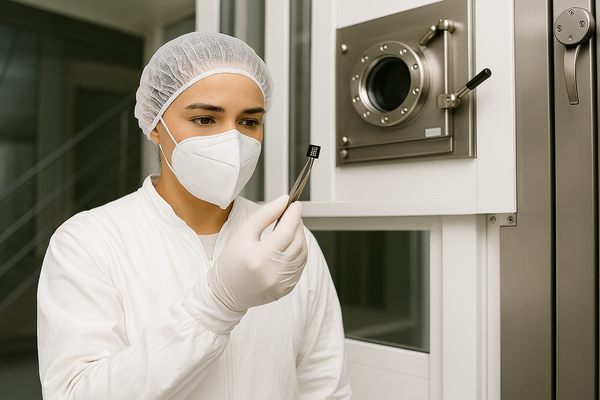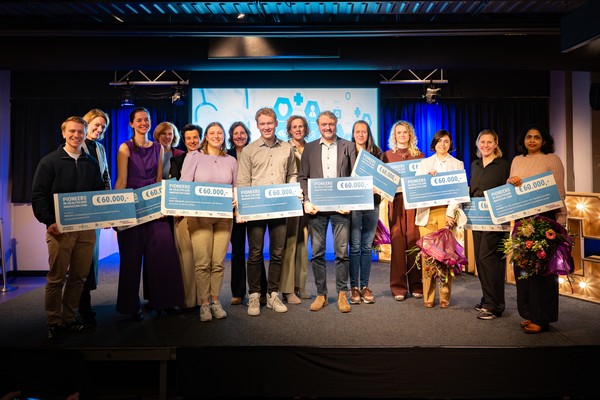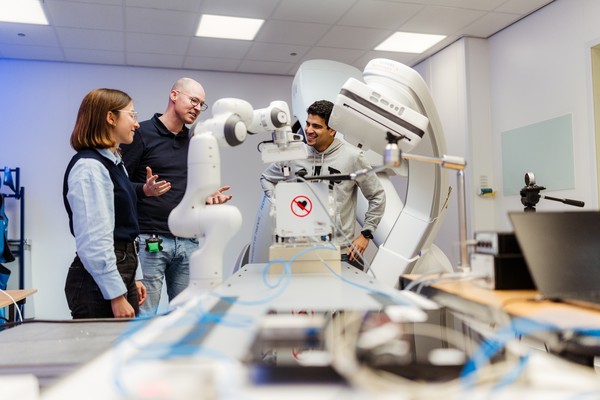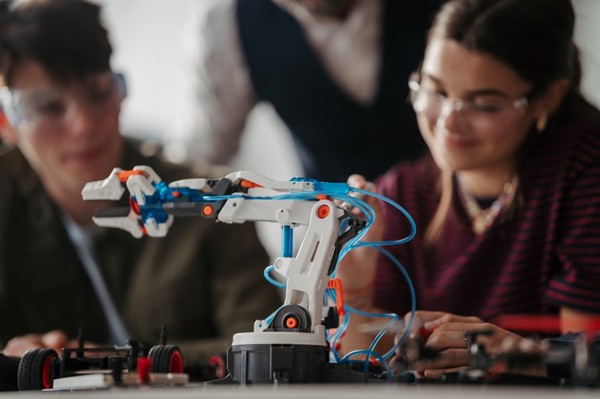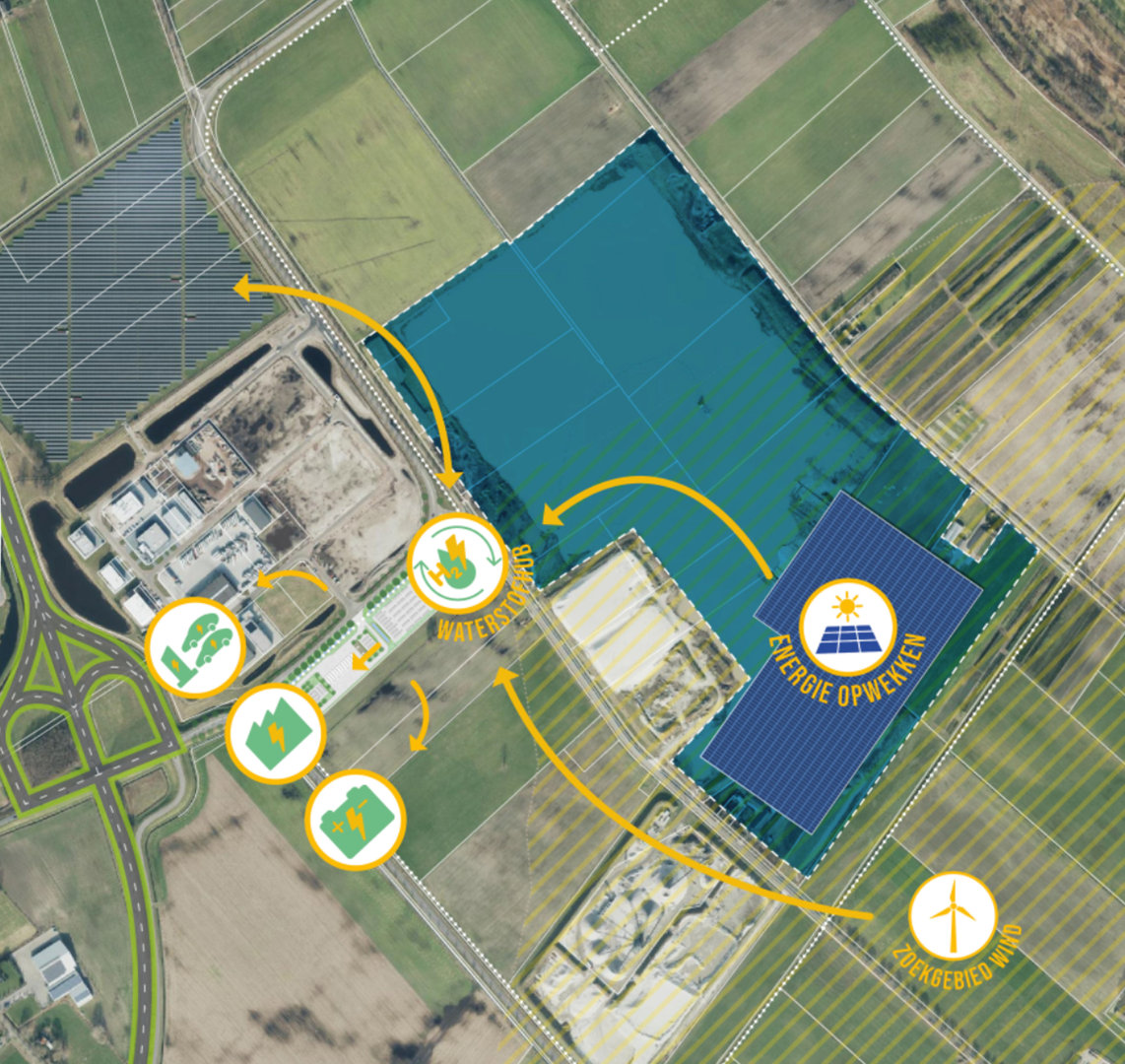
Energy Hub Twente: Twente is building a hydrogen-powered future
At the edge of Vriezenveen, on the Oosterweilanden industrial estate, lies a sand extraction lake. Today, it is still used for sand mining – but soon it will become the centrepiece of an energy project unique in the Netherlands. This is where the Energiehub Twente is taking shape: a site where solar and wind energy will be stored in batteries or converted into hydrogen, ready for immediate use in transport and industry. The Netherlands Enterprise Agency (RVO) recently awarded over €6 million in subsidies under the SWIM programme for the construction of the first hydrogen refuelling station in Twente and the acquisition of 23 hydrogen-powered vehicles. This investment represents a major step towards the realisation of the hub and will accelerate the application of locally generated green hydrogen in the region.
Date of Publication: 16 October 2025
Read time +/- 8.4 minutes
From sand extraction to energy innovation
The concept originated with Hydronex, part of the Roelofs Group. Project developer Jasper Heutinck explains how it began: “Five years ago, we asked ourselves whether the sand extraction lake could serve a dual purpose – both for sand mining and energy production. We quickly discovered that simply installing solar panels wouldn’t be sufficient. The grid is saturated. That meant we had to devise our own intelligent solutions.” A floating solar park will be installed on the water, and in the future, the Almelo-Tubbergen-Twenterand wind project will be developed ‘in its backyard’. Combined, these will generate a significant amount of energy – too much to feed directly into the grid. Therefore, smart conversion and storage solutions are the next crucial steps.
Hydrogen as an enabler
Batteries will buffer short-term fluctuations. For longer-term storage, Twenterand is opting for hydrogen. This can be used to power lorries, construction sites, and factories currently reliant on gas. “With hydrogen, you can store locally generated energy and deploy it when businesses actually need it,” says Heutinck. “That makes the energy transition feasible, even without a heavier grid connection.”
The entire value chain in one project
The Energiehub is a joint initiative of Hydronex, Fieten Olie, and the Municipality of Twenterand, in collaboration with H2Hub Twente – a cooperative comprising thirty companies and institutions, from logistics providers and industry to the water authority and fire brigade. Ton Beune of H2Hub Twente highlights the uniqueness of the approach: “We are not only managing production, but also the distribution. A hydrogen refuelling station will be built, and agreements are being established with the transport and industrial sectors. This allows us to overcome the typical chicken-and-egg dilemma often seen with hydrogen initiatives.”

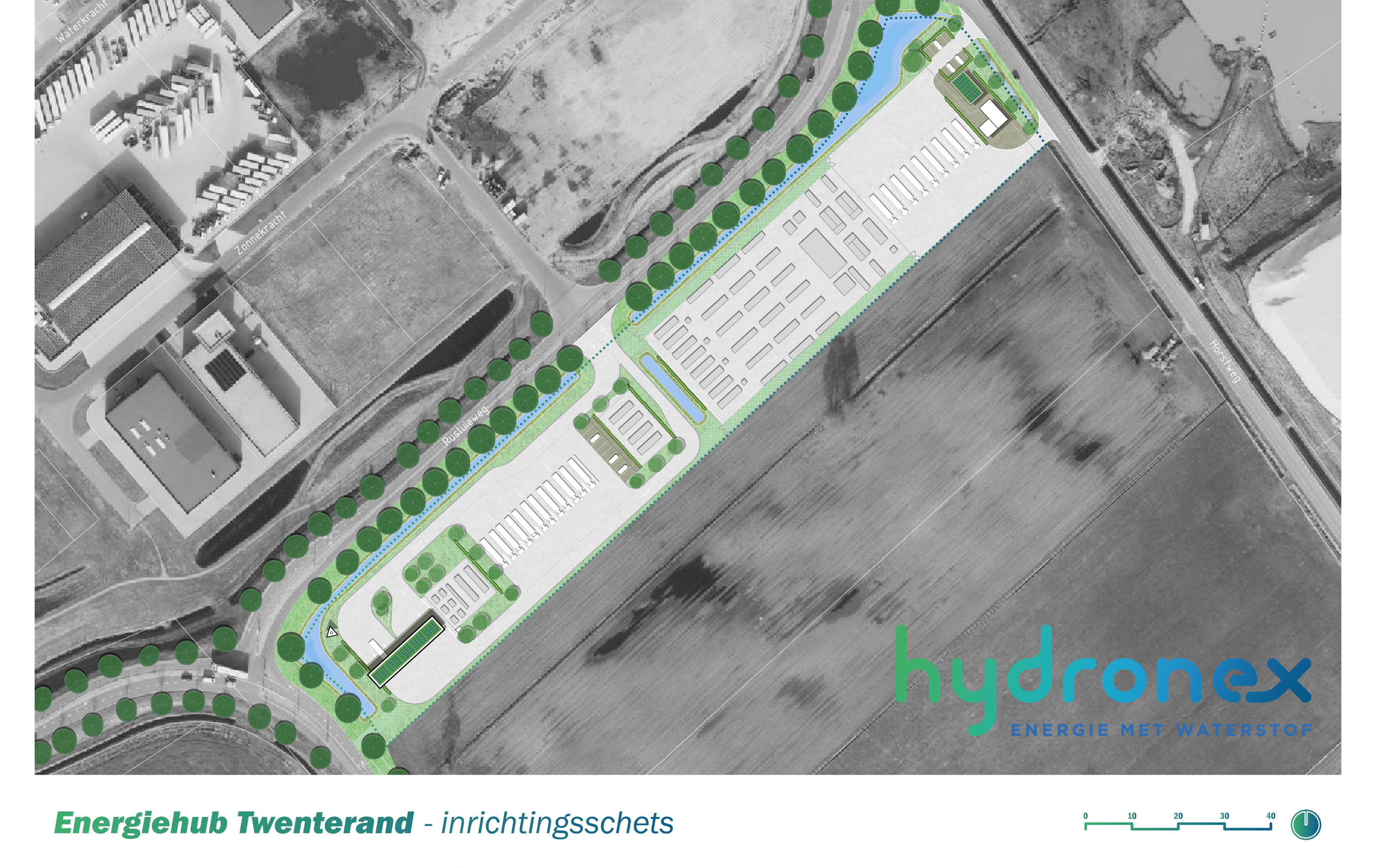
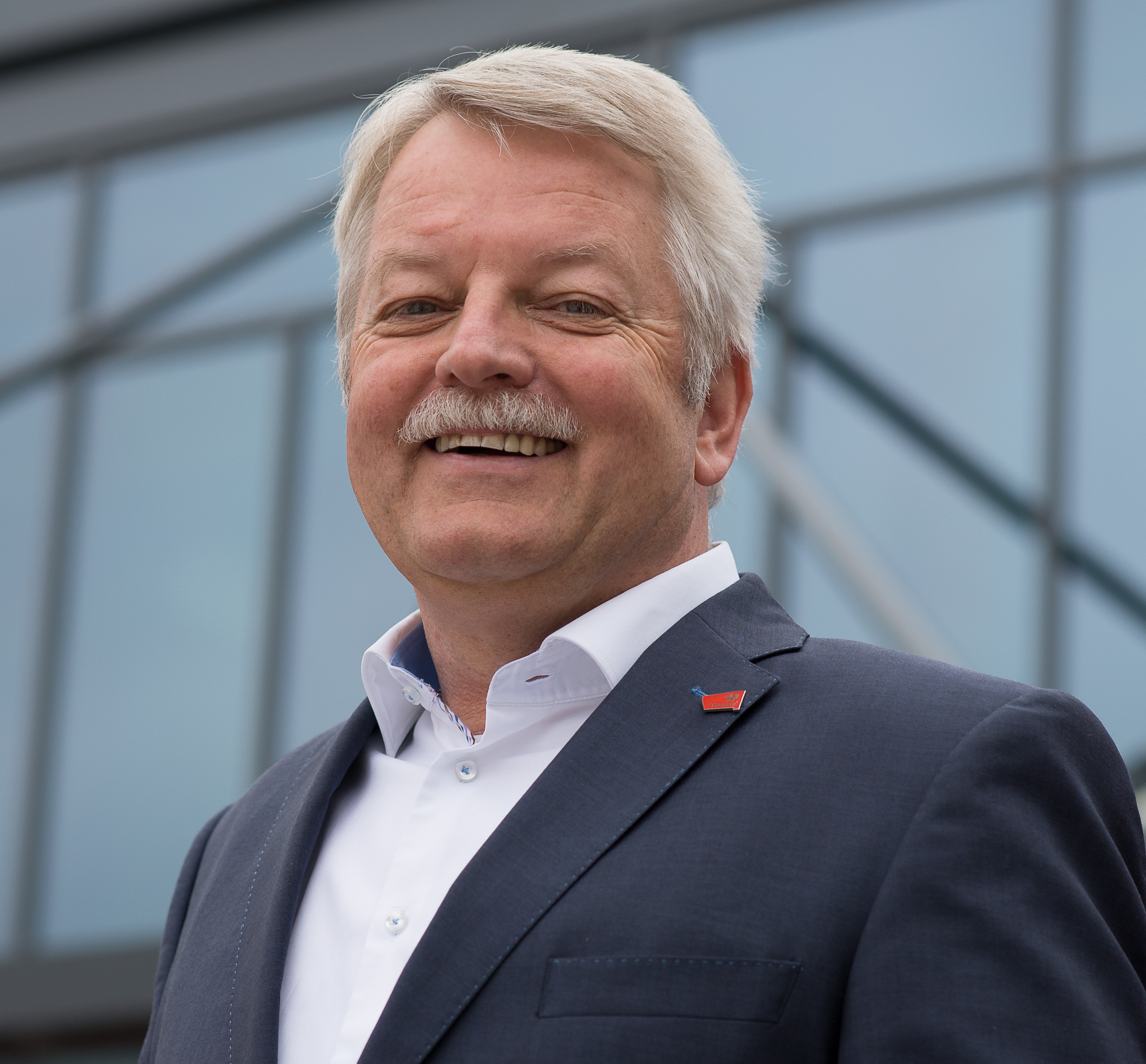
Sustainable water sourcing
Hydrogen production requires water. In Twenterand, this will not be drawn from the regular drinking water network, but rather from the sand extraction lake itself. Together with regional partners, this water will be purified into ultra-pure water suitable for electrolysis. Heutinck: “We deliberately chose the lake as a water source. That way, we work sustainably and avoid putting additional pressure on Twente’s already scarce drinking water supply.”
Backed by regional support
The first phase of the project was made possible through funding from the Regio Deal Twente via Twente Board. This enabled an extensive feasibility study, which confirmed that the project is technically, financially, and legally viable. Heutinck: “Without that support, we would never have got off the ground. The Regio Deal allowed us to explore the feasibility of the initiative. Now we are in the development phase, where parties are deciding whether to commit to investment.” For this next step, the Energiehub has again received support from Twente Board, which will help finalise engineering, permits, and financing. A definitive investment decision by the project partners is expected in 2026.
Learning by Doing
The hub is more than just a technical endeavour. Students from Saxion University of Applied Sciences and the University of Twente are conducting research into safety and potential applications. The fire brigade is involved in the design process and is gaining experience with hydrogen systems. Beune: “Our motto is learning by doing. We’re building small-scale pilots in Almelo where students and companies test together. That’s how you learn to run systems safely and efficiently. This knowledge will be directly applied in Twenterand.”
Looking Ahead
The ambition is to launch the first phase of the Energiehub in Twenterand by 2027, featuring a 5-megawatt electrolyser. This will make optimal use of existing grid connections and contracted capacities. The new floating solar park (20 MWp) will supply power directly to the electrolyser, while additional wind energy will be delivered via the national grid. Heutinck: “By strategically leveraging the opportunities presented by the new Energy Act, which comes into force in 2026, we can combine multiple renewable sources on a single grid connection. This allows us to optimise existing infrastructure and create capacity for the new floating solar park, thus accelerating the energy transition.” In the coming period, the focus will be on securing financing and concluding agreements with offtakers. If successful, the hub can grow modularly to 30 megawatts. This scaling-up, however, is contingent on the realisation of the wind turbines. Heutinck: “If the wind turbines are not built, the expansion of the electrolysis capacity will also not proceed.”
Integrated Regional Ecosystem
What makes Twenterand unique is the convergence of factors. The sand extraction lake provides both space and water; the adjacent industrial estate offers a customer base; and the region hosts committed partners willing to support the entire value chain. Heutinck concludes: “In Twenterand, everything comes together – solar and wind power, storage in batteries, hydrogen production, and direct industrial applications. That makes this project truly unique and a major opportunity for Twente. It also aligns seamlessly with the 2050 Overijssel Energy Vision, which includes the ambition to establish a local hydrogen supply.”
Want to Learn More or Get Involved?
Energiehub Twente is part of the Verduurzaming Bedrijfslocaties (Sustainable Business Parks) programme. This initiative is supported by Twente Board, Ondernemend Twente, the Province of Overijssel, the Dutch government, and VNO-NCW Midden (as lead partner on behalf of Ondernemend Twente). In collaboration with entrepreneurs, municipalities, knowledge institutions, and other organisations, we are developing solutions to address the grid congestion issues in Twente. We help business parks prepare for the challenges of today and tomorrow. The programme supports collective efforts by business locations to use energy more sustainably. It also explores ways to mitigate the effects of grid congestion – for example, through neighbourhood batteries or by better aligning local generation and consumption. Projects have already launched in eight municipalities across Twente. In 2025 and 2026, new business collectives can still register to participate. Interested in learning more or joining the programme? Please contact the Verduurzaming Bedrijfslocaties programme team.
€6 Million SWIM Subsidy for Hydrogen Refuelling Station in Twente
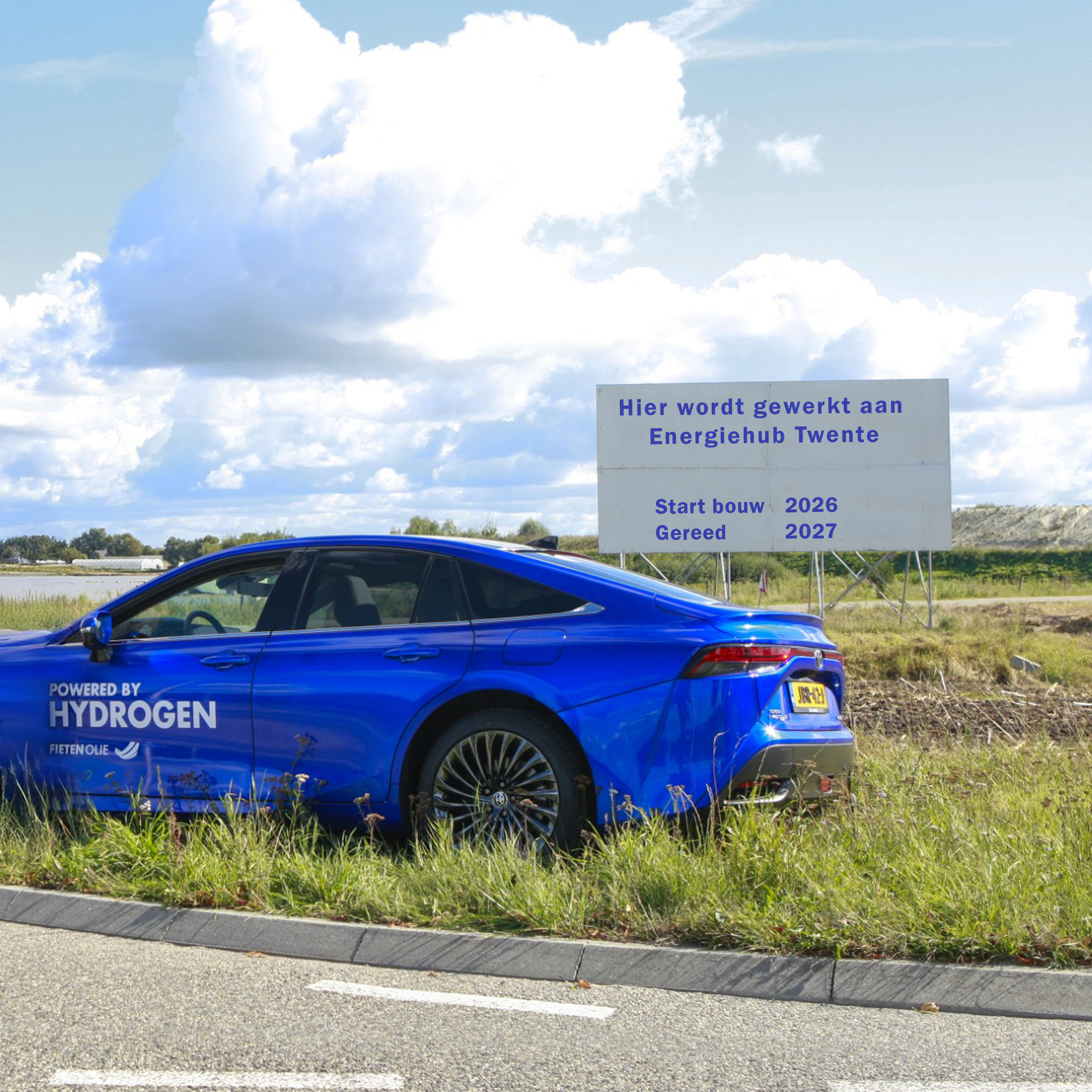
The Netherlands Enterprise Agency (RVO) has awarded over €6 million in subsidies to the SWIM consortium in Vriezenveen for the construction of the first hydrogen refuelling station in Twente and the procurement of 23 hydrogen-powered vehicles. The subsidy application was submitted by Hydronex on behalf of the consortium.
Fieten Olie will begin construction in the second half of 2026 near the N36 motorway. From the end of 2027 onwards, Hydronex will supply locally produced green hydrogen to the station and to the regional industry. This provides a significant boost to the hydrogen ecosystem in Twente, further advancing sustainable mobility and the realisation of the Energiehub Twente.
Kim Peddemors


